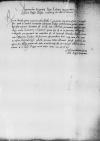List #2663
Sigismund I Jagiellon do Ioannes DANTISCUSWielowieś, 1543-10-10
| odebrano Schmolainen (Smolajny), 1543-10-19 Rękopiśmienne podstawy źródłowe:
| ||||
Tekst + aparat krytyczny + komentarz Zwykły tekst Tekst + komentarz Tekst + aparat krytyczny
Reverendo in Christo Patri, domino
Reverende in Christo Pater, sincere nobis dilecte.
Cum annus iam intercesserit et eo amplius, quod in
Datae in
Ad mandatum sacrae maiestatis regiae proprium


 BCz, 1601, p. 484
BCz, 1601, p. 484